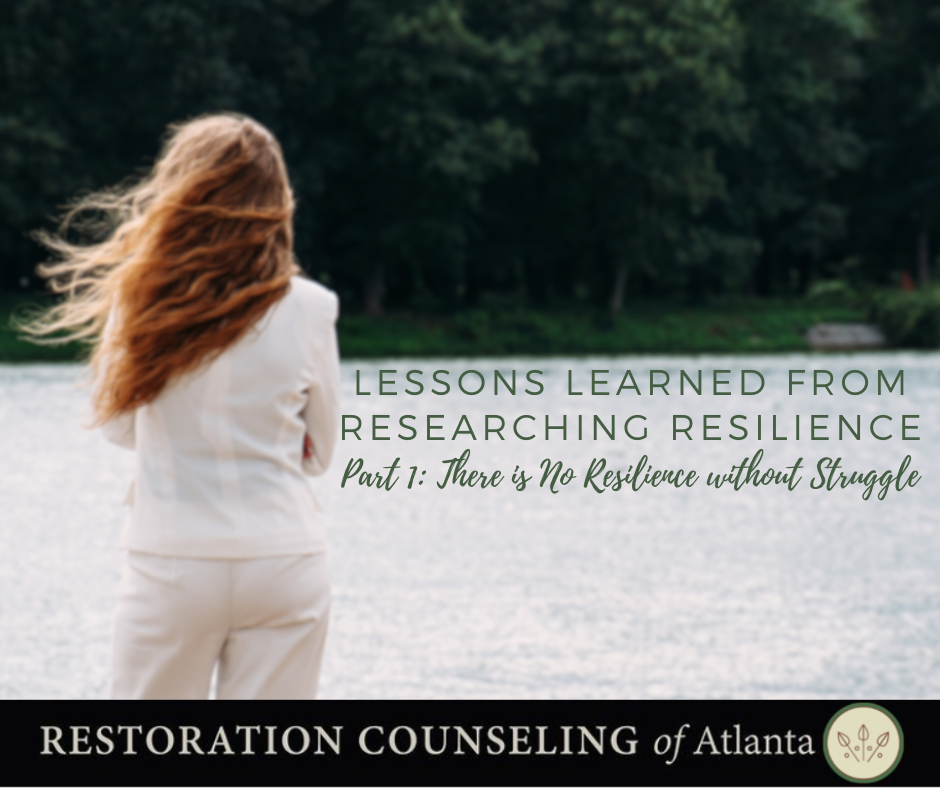Part 1: There is No Resilience Without Struggle
The phrase “bouncing back” is regularly used to conceptualize resilience. However, resilience involves much more than “bouncing back.”
As part of my social psychology doctoral dissertation, I conducted a study on resilience. During this study, I learned valuable lessons (both from talented researchers and from my participants) that I believe hold significance for managing our mental health and supporting the mental health of others.
In this several-part series, I’ll share what I’ve learned about researching resilience and, more importantly, how we can apply science-based resilience strategies to our daily lives.
A Word of Caution
Before I share my “lessons learned,” I ask you to think about this material through a non-judgmental lens. It is easy to point the finger and label yourself, another person, or even a generation as “weak” or “less resilient.” A more helpful stance is to anchor your thinking in building resilience in yourself or supporting a person or group that is struggling.
The Study of Resilience
The study of resilience emerged organically from long-term studies examining risk factors in groups of children experiencing a variety of stressors. Scientists noted that several children in these at-risk groups were able to thrive in adulthood, despite experiencing extreme adversity. Initially, these children were seen as “special” and somehow impervious to hardships. Over time, however, researchers began to see the “ordinary magic” or commonness of resilience. Resilience can be cultivated because of our brain’s ability to adapt and change. In other words, this “ordinary magic” is for everyone.
The Science of Resilience
Researchers have discovered that resilience involves the interplay of an individual’s portfolio of risk and protective factors.
- Internal factors relate to elements associated with an individual, such as biology, mindset, attitude, personality, and coping skills.
- External factors are related to elements associated with an individual’s environment or experience, such as upbringing, social support, and positive and negative experiences.
The traits of an individual influence their experiences and environment, while the experiences and environment simultaneously influence the individual. Thus, we are always the influencers AND the influenced.
There is No Resilience Without Stress
As I poured over thousands of articles, one of the first things that jumped out at me was the inclusion of struggle, hardship, loss, and trauma. Resilience involves “successfully adapting to difficult or challenging life experiences” (APA, 2023). You cannot be resilient if you do not have difficulty.
When individuals (or their children) experience hardship, the fear that they are doomed often arises. While this suffering is a stumbling block, it also provides an opportunity for growth.
Research tells us that we overestimate how negatively our child (or ourselves) will be impacted by hardship and underestimate our ability (our child’s ability) to recover. In other words, we predict things will be worse, and we won’t have what it takes to handle it, even though we will!
We Need Stress
We have a negative view of stress and difficulty; however, stress itself is not the enemy. Overcoming challenges helps us gain resilience. “Identify a concept or event that has helped you grow into the person you are today.” Questions such as this appear on many job or college applications. If I were to guess, you probably read this question and immediately thought of a lesson learned or a challenge overcome.
When people experience stress, their bodies become physiologically activated. This reaction motivates us, and we take steps to achieve, plan, or keep ourselves secure. Lack of stress and lack of perseverance can cause us to be unmotivated, disengaged, and bored. When there is no need to tolerate stress, our ability to do so lessens; then, when we do experience a challenge, it hits us like a sack of bricks.
There will be life events and traumatic experiences that overwhelm our ability to cope, and it takes time and support to recover from these situations. However, not all stressful, uncomfortable, unpleasant, challenging, or difficult life experiences are traumatic. Furthermore, those who do experience trauma may also experience post-traumatic growth, which is a sense of elevated functioning after recovering from a traumatic experience. While adversity can be life-changing, that change doesn’t have to be negative.
Research in Practice
Certain techniques have been demonstrated in research to enhance resilience. For example, simply labeling an adverse experience as a challenge rather than a hardship reduces the impact of the stress, and having individuals reflect on situations where they have overcome difficulty enhances their ability to persevere through future adverse events.
Reflect:
- How do you view challenges (yours and others)?
- Do you view negative experiences as potential threats, dangers, and traumas OR as opportunities for growth, learning, and resilience?
- Recall a time when you thought you could NEVER do something, and you did. (Think about big and little challenges.)
- Reflect on small challenges you (or your child) have survived during different stages of life.
- If it is challenging to think of yourself as an overcomer, consider where you are a survivor (even in small ways).
Steps Toward a Resilient View of Stress and Struggle
- First and foremost, validate the stress or hardship you (or your child) are facing. This step is vital to avoid shutting down someone you care about or ignoring your own struggle.
- Paraphrase what you are thinking (or hearing others say) and label the feeling you (or others) are experiencing. For example, “This really feels like a loss for me/you,” “This project is so overwhelming I don’t feel like I can do it,” or “It doesn’t feel like this will ever get better.”
- Next, reflect on situations where you (or your child) have overcome something challenging in the past. For example, “I remember when X happened, I was so scared and frustrated… but over time, it got better. I handled that, so maybe I can handle this too.”
- What specific assets helped you (or your child) overcome challenges in the past? Relationships, creativity, exercise, determination, external purpose (helping others), intellect, religion, seeking support (such as a counselor, mentor, or spiritual leader), and learning a new skill are all assets that can help you or your child move forward.
- View challenges as opportunities to learn and grow rather than automatically assigning them as negative and harmful. Even if they are momentarily harmful or hurtful to you (or your child), they are still proof of your/their ability to survive. Caution: Don’t forget to recognize the struggle. Make sure you first validate that this is hard on yourself or others. Even “normal” life changes can feel quite hard.
- Avoid comparison. Be careful not to compare yourself or someone you care about to the people who have it worse while appearing to handle it better. Saying, “Why aren’t you moving on?!” doesn’t help you or others recover any faster.
- Encourage small steps forward. Developing resilience is a process, not an event; no one wakes up one morning and suddenly becomes Malala Yousafzai. Think about the ways that you (or others) are taking small steps forward, such as engaging in more self-care or reaching out socially.
- Seek Support if Needed. If you feel that you or someone you love is “stuck” or unable to move forward, seek various forms of support. Having a multifaceted support system is often necessary (and always helpful) for an outcome of resilience.
Conclusion
The first lesson I learned while studying resilience is that to be resilient, we must experience adversity. Unfortunately, in this world, we have stressors large and small. Adversity can devastate us, and it’s important to validate that struggle. Yet the “ordinary magic” of resilience isn’t magic at all. It’s common, and it’s God-given.
From a biblical perspective that happens to align with research (I love it when that happens!), God provides us with amazing brains that have the capacity to learn, grow, and thrive in our relationship with Him and others. We are also able to utilize the gifts and talents He has graciously given us to help us be more resilient. Resilience doesn’t mean we minimize or white-knuckle our way through a hardship.
We don’t need to be “special” or impervious to stress to emerge resilient. We are all capable of resilience with the right skills and support to help us through our trials. If you or someone you love is struggling, please contact Restoration Counseling to schedule with a counselor and further your journey toward resilience.
 Written by Lauren Hamrick, PhD, MS, EdS, LPC, RPT, CPCS
Written by Lauren Hamrick, PhD, MS, EdS, LPC, RPT, CPCS
lauren@restorationcounselingatl.com
Roswell Location
Lauren Hamrick is an active, educationally focused therapist who enjoys using both evidence-based and out-of-the-box approaches with children and adults. Lauren is also a registered play therapist. She listens to the interests, knowledge, and experiences of her clients and incorporates them into her therapeutic approaches. Areas of focus include career-related stress, anxiety, PTSD, young adult issues, life transitions, abuse recovery, parenting, and family therapy. Lauren also enjoys working with couples who are dealing with parenting issues or are empty nesters.

